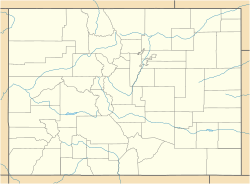Glen Echo, Colorado facts for kids
Quick facts for kids
Glen Echo, Colorado
|
|
|---|---|
| Country | United States |
| State | Colorado |
| County | Larimer |
| Elevation | 7,175 ft (2,187 m) |
| Time zone | UTC-7 (Mountain (MST)) |
| • Summer (DST) | UTC-6 (MDT) |
| Area code(s) | 970 |
| GNIS feature ID | 177129 |
Glen Echo is a small, quiet place in Larimer County, Colorado, United States. It's known as an unincorporated community. This means it's a group of homes or buildings that isn't officially part of a city or town. Instead, it's governed by the county it's in.
Contents
Discovering Glen Echo's Location
Glen Echo is nestled in a scenic part of Colorado. It sits right along Colorado State Highway 14. This highway is a main road that helps people travel through the area.
Where is Glen Echo on the Map?
If you were to look at a map, you'd find Glen Echo about 27.5 miles (which is about 44.3 kilometers) west-northwest of a bigger city called Fort Collins. It's quite a distance, making Glen Echo feel a bit more remote and peaceful.
Natural Surroundings: The Cache La Poudre River
One of the most important natural features near Glen Echo is the Cache La Poudre River. This river flows right by the community. Rivers are often vital for communities, providing water and sometimes opportunities for outdoor activities.
Neighbors of Glen Echo
Glen Echo isn't completely alone. To its east, it shares a border with another small community called Rustic. These small communities often have close ties with each other.
What is an Unincorporated Community?
You might be wondering what an "unincorporated community" really means. It's a place where people live, but it doesn't have its own local government like a city or town does.
How Unincorporated Communities are Governed
Instead of having a mayor or a city council, the people living in Glen Echo rely on the government of Larimer County. The county government handles things like roads, public safety, and other services for the community.
Why Some Places Stay Unincorporated
Sometimes, communities stay unincorporated because they are small. They might not have enough people to form their own city government. Other times, residents might prefer to be governed by the county. This can mean fewer local taxes or a simpler way of life.



